Coordinación
Una coordinación sólida puede evitar vacíos y duplicaciones en las respuestas humanitarias, así como garantizar que los PTM complementen otros tipos de asistencia. Sin embargo, el informe del «Estado Global de los Programas de Transferencias Monetarias» de la CALP Network muestra que la coordinación de la asistencia en efectivo es vista como débil y ad hoc, y que esto está teniendo graves repercusiones operativas.
Los donantes, las ONG y los líderes de los grupos de trabajo de transferencias monetarias (GTM) han pedido claridad sobre tres temas principales relacionados con la coordinación de la asistencia en efectivo:
- Quién debe ser responsable de asegurar una coordinación eficaz de la asistencia en efectivo;
- Cuál es la función y el mandato de los grupos de trabajo de transferencias monetarias, incluso en relación con las transferencias monetarias multipropósito;
- Cómo se debe dotar de recursos a la coordinación de asistencia en efectivo.
Tenemos que basarnos urgentemente en lo que funciona y proporcionar claridad a nivel mundial sobre las preguntas arriba mencionadas, adaptándonos a los diferentes contextos. Hace mucho tiempo que se deberían haber tomado decisiones claras basadas en necesidades operativas y no en la política de las agencias.
Prioridades actuales
El objetivo de la CALP Network es contribuir a seguir progresando en este tema en tres niveles: apoyar a los grupos de trabajo de transferencias monetarias a nivel regional; contribuir a soluciones prácticas para la coordinación de la asistencia en efectivo a nivel mundial; y convocar una discusión basada en la evidencia sobre temas clave, destacando puntos de decisión críticos y oportunidades de progreso.
Contenido destacado

Cash Coordination Tip Sheet
Guidelines and Tools
This tip sheet sets out established best practice, key guidance and resources for all aspects of cash coordination, intended as a clear, accessible and action-oriented guide for those engaged in coordination of cash and voucher assistance (CVA) at the field level.

Introducing the Cash Coordination Tip Sheet
Webinar
The CALP Network has developed a tipsheet setting out established best practice and key guidance and resources for all aspects of cash coordination, intended as a clear, accessible and action-oriented guide for those engaged in coordination of cash and voucher assistance at the field level.

Cash Coordination: A proposal from members in MENA
Blog Post
Earlier this year the CALP Network undertook regional consultations to explore options for cash coordination. This blog lays out recommendations from participants from the Middle East and North Africa who sketched out what cash coordination, and coordination more broadly, could look like in future to support a more effective, efficient and accountable response.
Últimos recursos
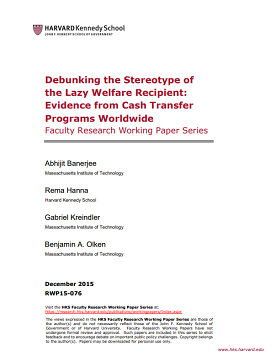
Debunking the Stereotype of the Lazy Welfare Recipient: Evidence from Cash Transfer Programs Worldwide
Report
Targeted transfer programs for poor citizens have become increasingly common in the developing world. Yet, a common concern among policy makers – both in developing as well as developed countries – is that such programs tend to discourage work. We re-analyze the data from 7 randomized controlled...

Enhancing Food Security and Nutrition during the First 1000 Days through Gender-sensitive Social and Behavioural Change: A Technical Resource Guide
Guidelines and Tools
This technical resource guide is designed to build the capacity of development practitioners working in nutrition and food security to plan, implement, and evaluate gender-sensitive SBC programming in order to improve nutritional outcomes for pregnant and lactating women (PLW) and children under two. It...
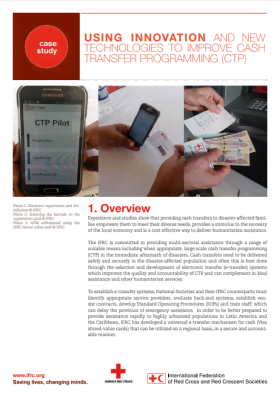
Using Innovation And New Technologies to Improve Cash Transfer Programming (CTP)
Report
Experience and studies show that providing cash transfers to disaster-affected families empowers them to meet their diverse needs, provides a stimulus to the recovery of the local economy and is a cost effective way to deliver humanitarian assistance. The IFRC is committed to providing multi-sectoral...
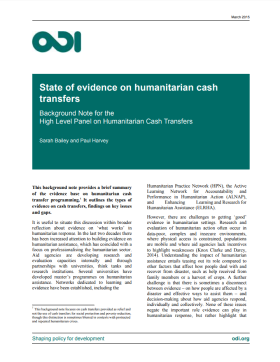
State of Evidence on Humanitarian Cash Transfers
Policy paper
The “State of evidence on humanitarian cash transfers” background note provides a brief summary of the evidence base on humanitarian cash transfer programming. The report also outlines the types of evidence on cash transfers, findings on key issues and gaps. This publication is an output of the...

Markets in Crises: South Sudan case study
Report
Not long after achieving independence, South Sudan descended into conflict, which has fuelled displacement and food insecurity.Although markets continue to function in the country, humanitarians have paid relatively little attention to market-based responses to the crisis. Looking primarily at Juba, this...

AAP Minimum Standards for Complaints & Feedback
Guidelines and Tools
A complaints and feedback mechanism (CFM) is a formal mechanism for receiving and responding to complaints from people in communities where we implement programmes. The main objectives are to increase the influence of affected communities over programmes, ensure that incidences of dissatisfaction with the...
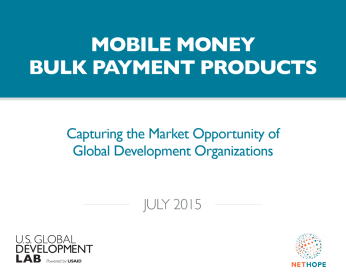
Mobile Money Bulk Payment Products: Capturing the market opportunity of global development organizations
Presentation
International relief and development organizations (DOs) receive significant aid funding from donors, which they regularly disburse in high volume, low value payments to millions of recipients for program and operational expenses. DOs and donors are increasingly using and promoting the use of new digital...
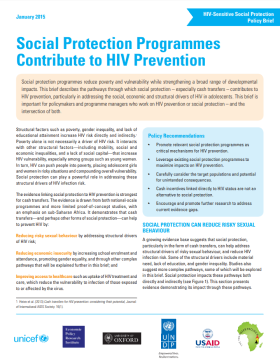
Social Protection Programmes Contribute to HIV Prevention
Policy paper
Social protection programmes reduce poverty and vulnerability while strengthening a broad range of developmental impacts. This brief describes the pathways through which social protection – especially cash transfers – contributes to HIV prevention, particularly in addressing the social, economic and...

Review of Targeting of Cash and Food Assistance for Syrian Refugees in Lebanon, Jordan and Egypt
Report
This report is an output of a consultancy to review the process of developing protocols for targeting cash and food assistance to Syrian refugees in Lebanon, Egypt and Jordan during 2014. Under the auspices of the High Level Meeting between WFP and UNHCR (May 2014) and the WFP and UNHCR Joint Action...
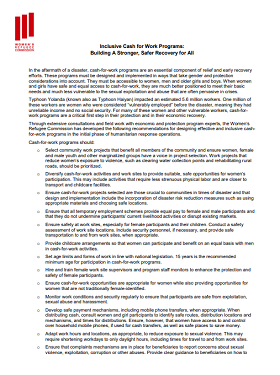
Inclusive Cash for Work Programs: Building A Stronger, Safer Recovery for All
Report
In the aftermath of a disaster, cash-for-work programs are an essential component of relief and early recovery efforts. These programs must be designed and implemented in ways that take gender and protection considerations into account. They must be accessible to women, men and older girls and boys. When...

Workshop Report – Cash Transfer Programming (CTP) in Northern Syria: Where are we now and where do we want to be?
Report
This report summarizes the outcomes of a one day workshop on Cash Transfer Programming (CTP) that was organized by the Cash-Based Responses Technical Working Group (CBR-TWG) for Northern Syria on April 28th 2015 in Gaziantep, Turkey. The workshop was attended by a wide group of stakeholders from the...
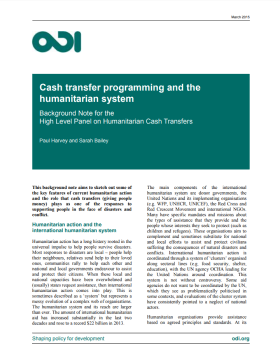
Cash Transfer Programming and the Humanitarian System
Policy paper
Cash transfer programming and the humanitarian system background note aims to sketch out some of the key features of current humanitarian action and the role that cash transfers play as one of the responses to supporting people in the face of disasters and conflict. Additionally, the publication...

Report from the Inaugural Markets and WaSH Learning Event
Report
This report summarizes the presentations and discussions that took place during a learning event on market-based programming targeting key humanitarian stakeholders in the WaSH sector. Held on October 13, 2015 at the IFRC office in Nairobi, the event was organized under the umbrella of the Markets in...

Final Report for Assessment of the Impact of Cash For Work Beneficiaries training for Phases IIB and IV
Report
Phases IIB and IV of the Cash For Work (CFW) project were implemented by FAO Somalia over the period 2013-2015 and aimed at enhancing access to food by the food insecure households in the short-term, while supporting restoration of food production through the rehabilitation/construction of productive...

Capacity Building Theory Of Change
Guidelines and Tools
Capacity Building is a foundation of the CALP Network’s vision, focus and mandate, and our Capacity Building Strategy emanates from a Theory of Change that describes how the CALP Network’s inputs and activities result in short-term outcomes and can lead to long-term outcomes and ultimate impact. The...
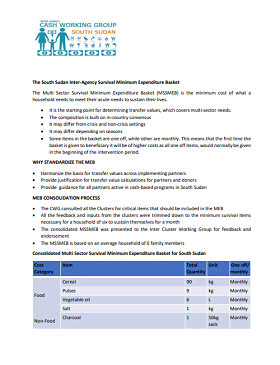
The South Sudan Inter-Agency Survival Minimum Expenditure Basket
Report
The Multi Sector Survival Minimum Expenditure Basket (MSSMEB) is the minimum cost of what a household needs to meet their acute needs to sustain their lives.
• It is the starting point for determining transfer values, which covers multi-sector needs.
• The composition is built on in-country consensus
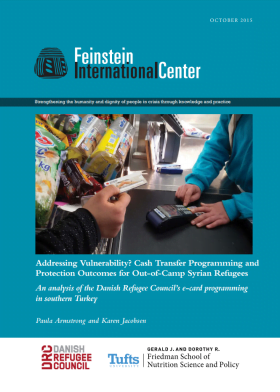
Addressing Vulnerability? Cash Transfer Programming and Protection Outcomes for Out-of-Camp Syrian Refugees
Report
This report explores key issues concerning vulnerability, targeting, and protection in cash transfer programming (CTP) by analyzing a Danish Refuge Council (DRC) project in southern Turkey. It is based on an ongoing “action research” collaboration between DRC and the Feinstein International Center...
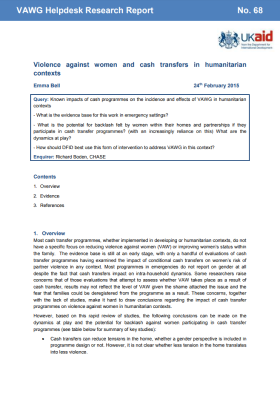
Violence Against Women and Cash Transfers in Humanitarian Contexts
Policy paper
This report addresses the known impacts of cash programmes on the incidence of violence against women in humanitarian contexts. Query: Known impacts of cash programmes on the incidence and effects of VAWG in humanitarian contexts What is the evidence base for this work in emergency settings? What is the...

Know Your Customer Standards and Privacy Recommendations for Cash Transfers
Guidelines and Tools
This report reviews how Know Your Customer (KYC) standards – rules designed to combat criminal money laundering and terrorism financing – are applied in humanitarian cash programs. The report examines the practices of aid agencies and their processing of the personal information of...
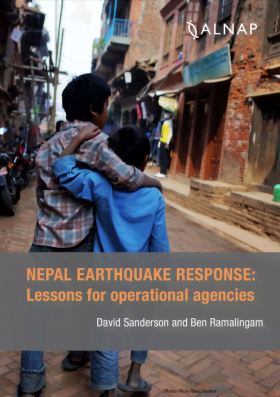
Nepal Earthquake Response: Lessons for operational agencies
Policy paper
In the aftermath of the April 2015 earthquake in Nepal, this paper looks at lessons drawn from previous comparable disasters and seeks to provide invaluable information and assistance to the operational agencies responding to the crisis. Seventeen Lessons give an overview of important learnings based on...